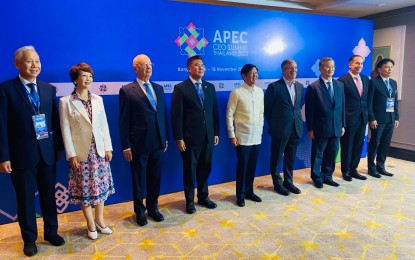[11.17] 기후 변화에 대처하기 위한 에너지 다양화를 위한 PBBM 배트
컨텐츠 정보
- 21,472 조회
본문
MANILA – "Ferdinand R. Marcos Jr." 회장 목요일에 세계 경제 성장을 유지하고 기후 변화의 최악의 영향을 피하기 위해 에너지원을 다양화하는 것의 중요성을 강조했습니다.
마르코스는 태국 방콕에서 열린 아시아태평양경제협력체(APEC) 정상회의 개회사에서 다음과 같은 글로벌 기후 협약 이행에도 불구하고 기후 위기를 해결하기 위한 진전이 "충분하지 않다"고 한탄했다. 유엔기후변화협약(UNFCCC)과 파리협정.
"Marcos"는 기후 변화가 세계 경제를 해칠 수 있는 "우리 시대의 가장 시급한 실존적 도전"이라는 점을 고려하여 "더 강력한" 조치가 필요하다고 말했습니다.
"UNFCCC 당사국 총회(COP 27)가 한창 진행 중이지만 더 강력한 기후 행동이 필요합니다. 현대 세계 경제의 에너지 수요가 계속해서 빠르게 확대됨에 따라 재생 에너지 및 기타 자원으로의 다양화가 필수적입니다."라고 그는 말했습니다. 포럼에서 말했다.
APEC 회원국인 "마르코스"는 기후 위기를 포함한 여러 글로벌 과제의 영향에 대응하기 위해 "구조적 및 정책적" 문제를 해결하기 위한 노력을 강화해야 한다고 말했습니다.
Marcos는 기후 변화가 전 세계에 영향을 미치는 "섬세한" 글로벌 식품 생태계의 일부로서 높은 인플레이션 및 지정학적 위기와 "상호 연결"되어 있다고 언급하면서 전화를 걸었습니다.
Marcos는 필리핀 정부가 현재 수력, 지열, 태양열 및 기타 저배출 에너지원과 같은 재생 가능 에너지원을 사용하는 데 주력하고 있다고 말했습니다.
그는 특히 그의 행정부가 2030년까지 발전 믹스에서 재생 에너지의 35%, 2040년까지 50%를 목표로 설정하고 있다고 말했습니다.
그는 필리핀이 국내총생산(GDP)의 6% 이상을 잃을 것으로 예상되기 때문에 기후 위기로 인해 "큰 위험"에 처한 국가 중 하나라는 것을 보여준 아시아 개발 은행(ADB)의 연구 결과를 인용하면서 성명을 발표했습니다. (GDP) 매년 2100년까지.
"Marcos"는 이전에 깨끗하고 지속 가능한 에너지원으로서 국가의 해상 풍력(OSW) 잠재력을 탐색하고 개발하려는 에너지부의 계획을 승인했습니다.
"마르코스"는 APEC 경제 지도자 회의에 처음으로 참석하기 위해 현재 태국에 있습니다.
APEC은 1989년 아시아 태평양 지역의 상호의존도가 높아지는 상황을 활용하기 위해 설립된 지역 경제 포럼입니다.
APEC의 21개 회원국은 균형적이고 포용적이며 지속 가능하고 혁신적이며 안전한 성장을 촉진하고 지역 경제 통합을 가속화함으로써 이 지역에서 더 큰 번영을 추구합니다. (PNA)
This is the Original Article from PNA NEWS
[11.17] PBBM bats for energy diversification to address climate change
MANILA – President "Ferdinand R. Marcos Jr." on Thursday emphasized the importance of diversifying energy sources to sustain global economic growth and avoid the worst impacts of climate change.
In his opening remarks during the Asia-Pacific Economic Cooperation (APEC) CEO Summit in Bangkok, Thailand, "Marcos," lamented that the progress made to address the climate crisis is "not enough," despite the implementation of global climate pacts such as the United Nations Framework Convention on Climate Change (UNFCCC) and the Paris Agreement.
"Marcos," said a "stronger" action is needed, considering that climate change is "the most pressing existential challenge of our time" that may hurt the global economy.
"The Conference of the Parties to the UNFCCC (COP 27) is in full swing, but stronger climate action is required. As the energy demands of the modern global economy continue to expand rapidly, diversification into renewables and other sources is imperative," he said during the forum.
APEC member economies, "Marcos," said, should step up efforts to address "structural and policy" issues to counter the effects of several global challenges, including the climate crisis.
Marcos made the call, as he noted that climate change is "interconnected" with high inflation and geopolitical crises, as part of a "delicate" global food ecosystem that affects the entire world.
Marcos said the Philippine government is now focused on using renewable energy sources such as hydropower, geothermal power, solar, and other low-emission energy sources.
He said his administration is particularly setting a target of a 35 percent share of renewable energy in the power generation mix by 2030 and 50 percent by 2040.
He issued the statement, as he cited the findings of the Asian Development Bank's study which showed that the Philippines is one of the countries that are at "great risk" from the climate crisis, as it stands to lose over six percent of gross domestic product (GDP) annually by 2100.
"Marcos," earlier approved the Department of Energy's plan to explore and develop the country's offshore wind (OSW) potential as a clean and sustainable energy source.
"Marcos," is currently in Thailand for his first participation in the APEC Economic Leaders' Meeting.
The APEC is a regional economic forum established in 1989 to leverage the growing interdependence of the Asia-Pacific.
APEC's 21 member economies seek greater prosperity in the region by promoting balanced, inclusive, sustainable, innovative, and secure growth and by accelerating regional economic integration. (PNA)
관련자료
-
이전
-
다음


